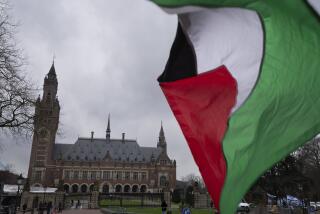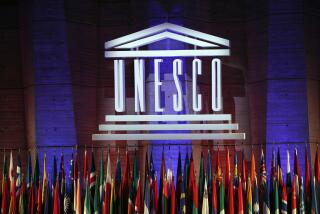U.N. council steps back from Kosovo
- Share via
UNITED NATIONS — The Security Council on Wednesday ended its attempt to resolve the status of Kosovo because of Russian objections, leaving it to the European Union and NATO to foster the breakaway province’s move toward independence without sparking new conflict in the Balkans.
Kosovo’s ethnic Albanian majority plans to declare independence from Serbia early next year, with the backing of the United States and most European nations. Serbia and its powerful ally, Russia, are trying to block the move, and warn that secession will ignite fresh violence in the region.
Serbian Prime Minister Voji- slav Kostunica told the Security Council secession would cause a crisis and warned that Serbia would defend its sovereignty. Although Kosovo is 90% ethnic Albanian and semiautonomous, Serbia regards it as the “integral and inalienable” heart of the Serbian nation, Kostunica said.
“Will for the first time in the U.N.’s history a decision be taken, contrary to the will of a democratic state and . . . of a U.N. founding member, to redraw its internationally recognized borders, to abolish its sovereignty and to amputate 15% of its territory?” Kostunica asked.
But Kosovo’s president, Fatmir Sejdiu, said Kosovo needed to be fully independent.
“We are exhausted after nearly two decades of isolation, war and political limbo,” he said, referring to the “ethnic cleansing” of Kosovo Albanians by Serbian leaders in the 1990s. “Lack of clarity about our status has held back our economy, discouraged international investment and prevented us from accessing international financial institution lending.”
Kosovo has been run by the United Nations and secured by the North Atlantic Treaty Organization since Western powers intervened in 1999 to stop bloody reprisals by Serbian security forces locked in a struggle with Albanian rebels. For 18 months, a U.N. special envoy, Martti Ahtisaari, shuttled between the two sides, trying to mediate an agreement over the province’s status. He presented a plan this year to allow Kosovo to move gradually toward independence under the stewardship of EU administrators and NATO forces. The plan emphasized that Kosovo’s secession would not set a precedent that could be used by other regions that would like to secede.
Russia and Serbia rejected the plan and called for negotiations to continue, but on Wednesday, key Security Council members said the two sides remained too far apart and talks were exhausted.
“We therefore need to move on now,” said a joint EU-U.S. statement, pledging to help see that Kosovo’s leaders maintain regional security, respect minority rights, preserve Serbs’ cultural and religious heritage and strengthen the rule of law.
“There is a worldwide understanding that Kosovo is in essence a European responsibility. Europe is ready to face this challenge,” the statement said.
Friday, EU leaders deployed about 1,800 police and prosecutors to Kosovo. Thousands of NATO troops will remain there to oversee security.
Kosovo’s lunge for independence pits Europe and Russia against each other. Russia has threatened to not recognize an independent Kosovo and use its veto power in the Security Council to keep Kosovo from becoming a member of the United Nations. Moscow could back Serbian nationalists bent on blocking statehood, diplomats say.
The EU is offering Serbia swifter membership if it allows Kosovo to go its own way without a fight. Yet-unresolved issues from the Balkan war still haunt the fragile relationship -- the EU also insists that Serbia first hand over the Bosnian Serb leaders who orchestrated “ethnic cleansing” in Bosnia-Herzegovina, Ratko Mladic and Radovan Karadzic, to the Hague war crimes tribunal.
U.S. Ambassador to the U.N. Zalmay Khalilzad called on his Russian counterpart to allow Kosovo out of its political and economic limbo, which is “hampering both Serbia and Kosovo’s advancement.” “We have to move on to the next step,” he said.
--
More to Read
Sign up for Essential California
The most important California stories and recommendations in your inbox every morning.
You may occasionally receive promotional content from the Los Angeles Times.












